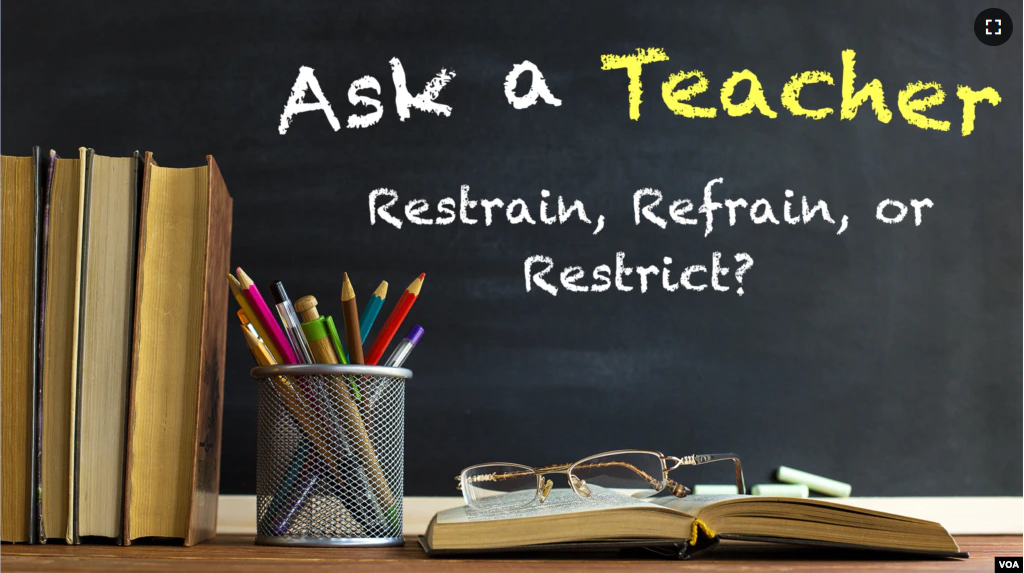Hello! This week on Ask a Teacher, we will answer a question about three verbs, “restrain,” “refrain,” and “restrict.”
Question
Dear Teacher,
I am Anora, your loyal reader from China. I’m glad to write this email. I am confused by the words “restrain,” “refrain,” and “restrict.” I sincerely hope to know their differences. Looking forward to your wonderful answers.
Yours, Anora.
Answer
Dear Anora,
Thanks for writing to us! This is an interesting question. These words appear similar, but they are different in their meanings, use, and especially whether they take a direct object or not.
Let’s look at each word and compare!
Restrain
Restrain is a verb that takes a direct object. In grammar, this means that it is transitive.
The first meaning is that you limit or prevent a person or even an animal from doing something.
I must restrain my cat with a leash when going outside.

Another meaning is that you prevent someone from doing something or deny them freedom by using physical force or official power. For example,
You should never restrain someone having a seizure by holding them down.
You can restrain yourself or others from some kind of action through methods of control. Like restraining your emotions or limiting yourself in some way.
I restrained myself from having another piece of pie on Thanksgiving.

You can also restrain things from getting too large.
The government raised interest rates in hopes of restraining inflation.
Refrain
Refrain is a verb that does not take a direct object; it is intransitive.
To refrain means that you stop yourself from doing something by choice.
I’m refraining from buying anything on Black Friday. There are better sales right before the holidays.

Refrain is also a noun. In music, it means a repeated part of a song, such as a melody or chorus.
We often remember refrains of songs because they are repeated.
It can also mean a word, phrase or saying that is repeated such as in a poem or song.
Lana Del Rey uses the refrain “red dress” in many of her songs.
Let’s move on to “restrict.”
Restrict
Restrict is a verb that takes a direct object. It means to put a limit on something or to reduce or prevent it.
In the US, the government restricts anyone under 18 years of age from voting in elections.

If you restrict a person or animal “to” something else, you have limited them to one thing.
They restrict their dog to a special diet for his health.
You can restrict something to a particular group or place.
During the height of the pandemic, many countries restricted entry to hospitals to authorized people or patients.
Please let us know if these explanations and examples have helped you!
What question do you have about American English? Send us an email at learningenglish@voanews.com
And that’s Ask a Teacher.
I’m Faith Pirlo.
Faith Pirlo wrote this lesson for VOA Learning English.
______________________________________________________________
Words in This Story
confused – adj. to be uncertain or unable to understand something
leash – n. a long, thin piece of rope, chain, etc., that is used for holding a dog or other animal
seizure – n. (medical) a state in which you become unconscious and your body moves in an uncontrolled and violent way
pie – n. a food consisting of a pastry crust and a filling, as of fruit or meat
Black Friday – n. the day after Thanksgiving when the start of holiday seasonal shopping begins; many businesses profit during this time and go into “the black”
phrase – n. a group of two or more words that express a single idea but do not usually form a complete sentence
authorized –adj. officially permitted or allowed to do something
